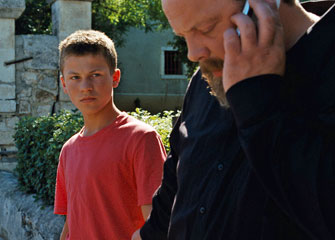
Following Alix Delaporte’s success with her first film, Angèle et Tony (2011), which won acting prizes at the Césars for Clotilde Hesme and Grégory Gadebois, the director has teamed up with the same actors for Le Dernier Coup de Marteau (The Last Hammer Blow), a low-key but affecting study of the difficult realities faced by a young boy in the south of France.
Set in and around Montpellier, the movie focuses on 13-year-old Victor (played with understated grace by newcomer Romain Paul), a promising soccer player who is forced to deal with both the serious illness of his mother, Nadia (Hesme), and the shock of meeting for the first time his absent father, Samuel Rovinski (Gadebois), a famous conductor who is in Montpellier to perform Mahler’s Sixth Symphony; the movie’s title refers to the hammer blows of fate that ring out in the symphony’s final movement.
Much of the action revolves around the inability of the central characters to communicate with each other. Nadia has decided to leave the trailer they live in (if one must live in a trailer, the beautiful maritime setting on the outskirts of Montpellier is certainly a better location than most) and move to her parents’ home in Chalons, but is unable to explain the reasons to her son, who is clearly attracted to the Spanish neighbors’ daughter. For his part, Maestro Rovinski is just as inarticulate as his newfound adolescent son as they try to get to know each other. It is only through Mahler’s music that the two are able to come to some kind of understanding.
Even though parts of the father-son relationship and one or two incidents in the film fail to ring true, Delaporte steers clear of overly sentimentalized portrayals of the central characters and, perhaps most convincingly, avoids what would have been an overly neat reunion between Victor’s parents; in fact, they never meet at all over the course of the movie. And what a pleasure to have the chance to hear extended extracts from Mahler’s extraordinary orchestral piece!
Favorite
